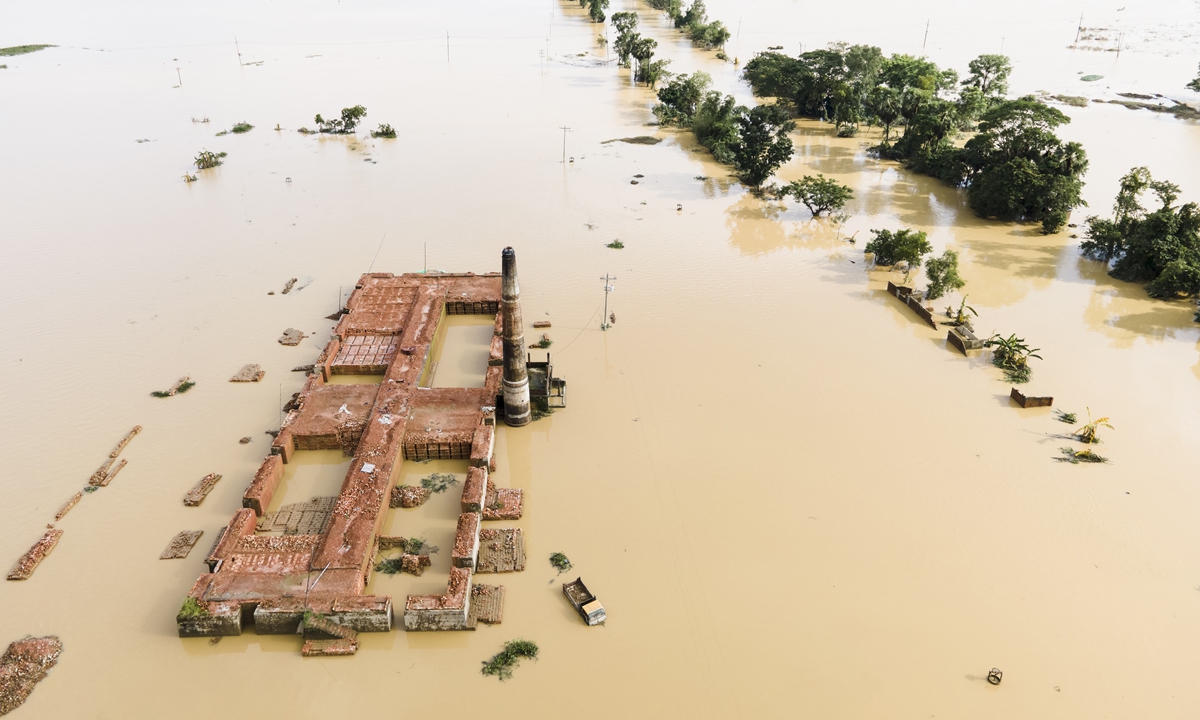
A brickyard and a car are half submerged in flood water in the Chandpur area of Chhagalnaiya upazila of Feni district of Chittagong division of Bangladesh in Feni, Chittagong, Bangladesh, on August 29, 2024. Photo: VCG
Bangladesh was recently hit by a "catastrophic flood." Affected by continuous monsoon rainfall and overflowing rivers, counties in southeastern Bangladesh have been trapped by floodwaters, houses and crops have been submerged, and livestock have been washed away. Dozens of people have died and millions of people stranded in devastated areas.
The flood in southeastern Bangladesh was reportedly mainly due to the water runoff from the Gumti River. Bangladeshis accused India of releasing water from the Dumbur dam in neighboring Tripura with no warning. Students in Dhaka held a protest against India's practice of unannounced water releases. Some people in Bangladesh believe that India's dam releases are for political reasons.
In response, the Indian Ministry of External Affairs released a statement denying the accusations, saying that the flood situation in Bangladesh is because "heavy rainfall has been continuing since 21 August in the whole of Tripura and adjoining districts of Bangladesh." The problem is that India and Bangladesh have been cooperating closely for some 30 years in terms of flood warnings.
Bangladesh has 54 cross-border rivers with India. While India is upstream of the shared river, Bangladesh is downstream. India has dominance over river water distribution and management. How to properly handle cross-border river issues with India is a major challenge facing the Bangladeshi government.
India has built dams in the country's border areas close to Bangladesh that intercepts water during droughts and releases water during floods. This seriously threatens the lives and property safety of Bangladeshi people as well as Bangladesh's ecological and environmental security. Once there are twists and turns in the relationship between India and Bangladesh, river water distribution and management will become a powerful weapon for New Delhi to control and deter Dhaka.
During the Sheikh Hasina administration, India has been actively expanding its influence in Bangladesh. The outside world generally believes that Hasina's sudden resignation is a major setback for India and the Indian government has also expressed its anxiety. New Delhi is worried that Hasina's downfall may affect its own interests in Bangladesh and that it will lose to other countries such as the US in geopolitical competition. It is also worried that the victory of the Bangladesh Nationalist Party and its allies in future elections could cause relations between the two countries to spiral out of its control.
Recently, India has been continuously challenging Bangladesh's interim government regarding the supply of electricity to Bangladesh, the supply of daily necessities and production materials, visa issuance for Bangladeshi citizens to India, and the protection of the interests of Hindus in Bangladesh. It has to be suspected that the "dam opening without warning" was probably intentional by India. It is not ruled out that India hopes to use these means to force the interim government of Bangladesh to adopt policies that are beneficial to India.
The floods in Bangladesh have been widely reported by the US media, and coverage by CNN and others have hinted that India bears certain responsibility for the floods in Bangladesh. In response, India specifically stated that such reports were "misleading." This also reflects the current status of India-US relations.
The Hasina government has annoyed Washington as it refuses to become part of the US' "Indo-Pacific Strategy," and has been opposed to the signing of a military agreement between Bangladesh and the US. Meanwhile, India has been concerned about potential military cooperation between Bangladesh and the US. Although the US and Indian governments called their relationship a "defining partnership of the 21st century," the US is still troubled by India's "strategic autonomy" and its great power ambition. In this sense, the recent changes in the Bangladesh government have also exposed the contradictions between the US and India.
The author is secretary-general of the South Asia and China Center of the Shanghai Institutes for International Studies. opinion@globaltimes.com.cn




